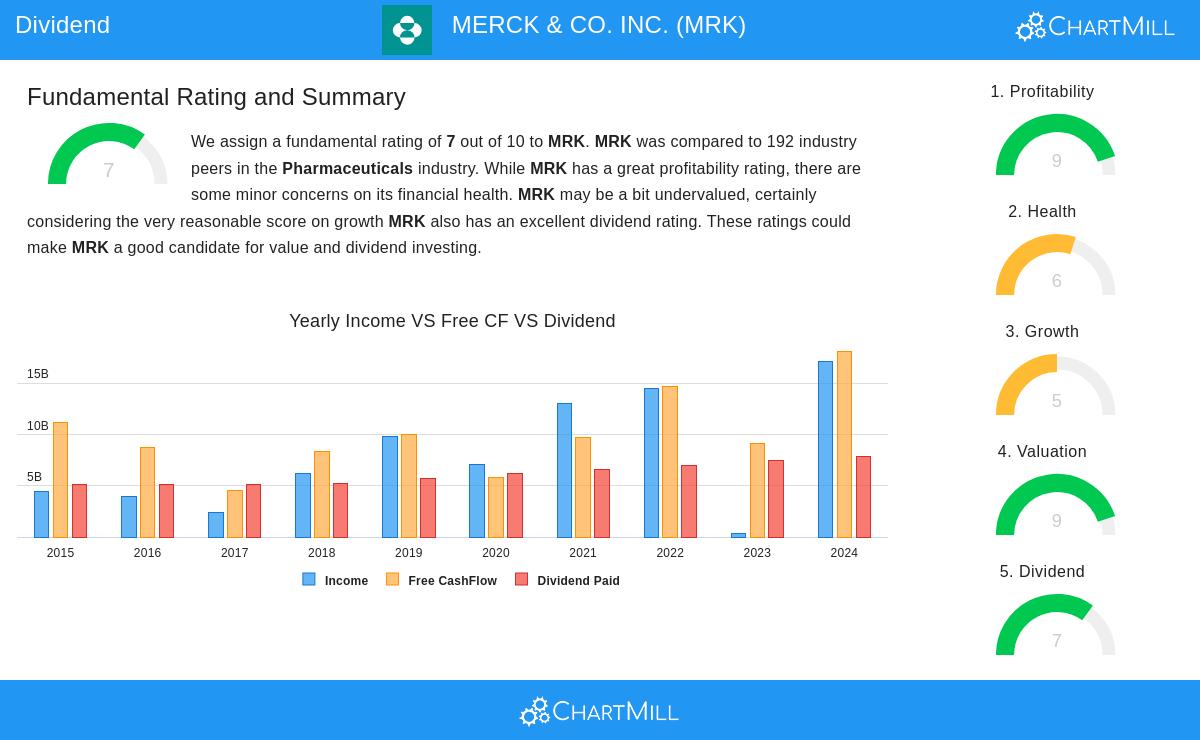Investors looking for dependable income often use dividend investing, a method centered on finding companies that not only provide regular dividends but also have the financial capacity to keep and possibly increase those payments. A structured way to do this is by filtering for stocks that display a mix of a high dividend score, good profitability, and acceptable financial condition. This process helps remove companies where high yields could be at risk because of fundamental business issues. One stock that appears from using these filters is MERCK & CO. INC. (NYSE:MRK), a worldwide healthcare company.

Dividend Reliability and Growth
For dividend investors, the durability and growth path of payments are critical. A high dividend score usually indicates good results in these areas, and Merck displays several favorable characteristics that add to its attractiveness.
- Attractive and Competitive Yield: Merck provides a yearly dividend yield of 3.58%, which is higher than the S&P 500 average of about 2.41%. Significantly, it is in the top group of its pharmaceutical industry competitors, offering a better dividend than almost 95% of them.
- Strong Dividend Growth History: The company has shown a dedication to giving value to shareholders, with a dividend that has increased at a notable yearly rate of 6.90% over the last five years. This steady increase is a sign of a dependable dividend stock.
- Proven Track Record: Merck has distributed a dividend for at least ten years and has not lowered it in that time. This extended and steady record gives investors assurance about the company's focus on its shareholder returns.
These elements are important for the dividend investing method because they signal not only a present income source, but one that could grow and exceed inflation over many years, thus raising the investor's actual purchasing power.
Profitability Supporting the Payout
A company's capacity to produce earnings is the source that finances its dividend. Without good and consistent profits, even the most attractive dividend policy is in danger. Merck’s very good profitability score of 9 out of 10 indicates it has a strong business framework able to maintain its shareholder payments.
The company's margins are a primary measure of its financial capacity. It has a profit margin of 29.63% and an operating margin of 38.08%, both of which are in the top 5% of the pharmaceutical industry. Also, its returns on invested capital and equity are excellent, greatly exceeding industry averages. This high degree of profitability means Merck produces sufficient earnings from which to distribute dividends, lowering the chance of a future reduction and offering a buffer during economic difficulties. For a dividend investor, this good profitability is an essential base that makes sure the income source is built on a firm foundation.
Financial Health and Sustainability
While profitability provides for the dividend, financial condition makes sure the company can handle problems without endangering its obligations. Merck’s health score of 6 out of 10 indicates a mostly stable financial situation with some points to observe. The company's solvency is a specific positive, with an Altman-Z score showing low bankruptcy risk and a debt-to-free-cash-flow ratio that indicates it could repay its debts in a practical period. This solvency is important for dividend investors, as a company with high debt might need to reduce its dividend to handle debt responsibilities.
However, the review also states that Merck's liquidity ratios, like its current and quick ratios, are in the bottom part of its industry. While still at levels viewed as financially acceptable, this implies investors should keep an eye on the company's short-term asset management. The total health picture supports the dividend method by verifying that the company is not overwhelmed by debt and has a workable capital structure, which adds to the dividend's perceived security.
Valuation and Overall Assessment
From a valuation viewpoint, Merck seems priced attractively, which can be a positive for dividend investors searching for fair entry points. The stock's Price-to-Earnings ratio of 11.88 is much less expensive than both the wider S&P 500 and the average for its industry. Other measures, like the Price-to-Free-Cash-Flow and Enterprise-Value-to-EBITDA ratios, also point to a low valuation compared to peers. While valuation is frequently a secondary consideration for pure dividend investors next to yield and safety, a stock with a low price can offer the possibility for price gains in addition to the dividend income.
A full review of Merck’s fundamental report, which explains these scores and measures, is available for a more detailed look: View the Full Fundamental Analysis for MRK.
Exploring Further Dividend Opportunities
Merck & Co. is an interesting example of a stock that fits a systematic dividend investment method, mixing a good yield with good profitability and sufficient financial health. For investors curious about finding other companies that satisfy similar strict filters, this screening process can be used to find a larger group of possible investments.
You can examine the full list of qualifying stocks by using the "Best Dividend Stocks" screen yourself: Find More High-Rated Dividend Stocks Here.
Disclaimer: This article is for informational purposes only and does not constitute investment advice, a recommendation, or an offer or solicitation to buy or sell any securities. All investment decisions should be based on your own research, financial situation, and risk tolerance.





